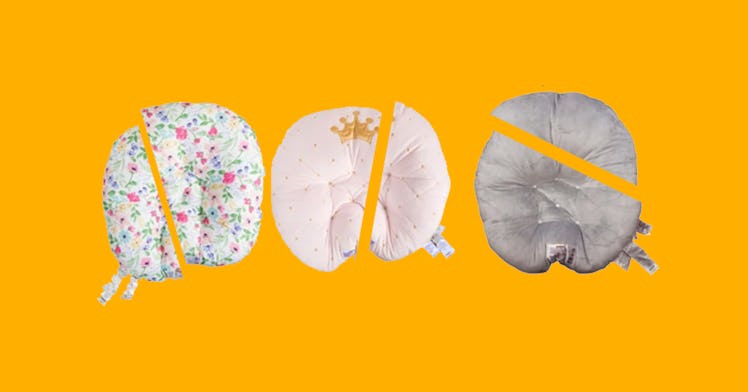3 Million Boppy Infant Loungers Have Been Recalled. Here’s What to Know
The Boppy, the ultra-popular infant lounging product, is being recalled after being linked to 8 infant deaths.

On September 23, 2021, the U.S. Consumer Product Safety Commission and the Boppy Company launched a recall of about 3.3 million Boppy Original Newborn Loungers, Boppy Preferred Newborn Loungers, and Pottery Barn Kids Boppy Newborn Loungers. 35,000 of those product recalls are for products that were sold in Canada.
The products have been recalled after eight reports of infant deaths associated with the boppy lounger. The infants “reportedly suffocated after being placed on their back, side or stomach on the lounger and were found on their side or on their stomach.”
The product, per Boppy, “was not marketed as an infant sleep product” and “includes warnings against unsupervised use.”
These deaths occurred between December 2015 and June 2020. The official hazard warning on the bopper is that “infants can suffocate if they roll, move, or are placed on the lounger in a position that obstructs breathing, or roll off the lounger onto an external surface, such as an adult pillow or soft bedding that obstructs breathing.”
The Boppy Lounger is not safe for infant sleep for these reasons. Acting Chairman of the CPSC, Robert S. Adler, says the products and “pillow-like products are not safe for infant sleep, due to the risk of suffocation. Since we know that infants sleep so much of the time — even in products not intended for sleep — and since suffocation can happen so quickly, these Boppy lounger products are simply too risky to remain on the market.”
The recall involves all models of Boppy Newborn Loungers and was sold through Pottery Barn Kids, Target, Walmart, Amazon, and other baby product stores and mass merchandisers, and was sold between January 2004 and September 2021 for about $30 to $44.
The Consumer Product Safety Commission urges those who bought the products to immediately stop using the Boppy Loungers and call the Boppy Company in order to receive a refund of the product.
But per a statement from Nancy Cowles at Kids in Danger, a non-profit that fights for product safety for kids and infants, says that “while the company may have warned about sleep, the intuitive use for a newborn lying on one is to let them continue to sleep on it. Supervision, even close supervision while sleeping in an unsafe product is not enough. Positional asphyxiation can happen even as a baby appears to be sleeping.”
This isn’t the first time that the CPSC has had to take action against a product that is not technically marketed for infants to sleep in but is widely used as a product, like the Fisher-Price Rock’n’Play, which had been linked to dozens of deaths and which the company allegedly did not take sufficient action on until a massive recall of the product earlier this year. (At the time, Fisher-Price says the Rock ‘n’ Play was designed “and developed following extensive research, medical advice, safety analysis… It met or exceeded all acceptable regulatory standards.”)
Soothers, gliders, and other sleep products that are tilted at a certain angle are also unsafe for babies and have also been recalled in recent months.
For parents who want to know what, exactly, is safe for their babies to sleep in, the new CPSC Infant Sleep Product Rules that the agency announced in June of 2021 will help make major, and significant steps, on getting unsafe products off the market that kill infants.
That rule will require all infant sleep products, “which are marketed or intended to provide sleeping accommodations for infants up to 5 months of age, and that are not currently subject to any of CPSC’s standards for infant sleep, to meet a mandatory safety standard generally applicable to bassinets and cradles.”
The new rule will mean that more products on the market will have to align with the American Academy of Pediatrics’ best practices for infant sleep.
As for where infants should sleep, parents should always remember the ABCs of infant sleep: infants should be sleeping alone, without pillows, toys, stuffies, blankets, or people near them, on their backs, in a crib on a hard mattress.
This article was originally published on